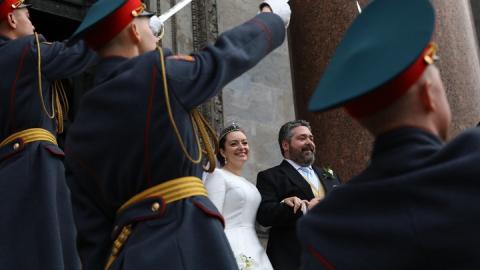Grand Duke's Wedding
Primary tabs

The wedding in St. Isaac’s Cathedral in St. Petersburg of Grand Duke Georgy Mikhailovich Romanov shook our society. For a long time, I have not seen so much poison and rudeness against the descendant of the glorious family of Russian tsars. The impression is that the rage of the envious proletarian masses has flared up again. To them was added the malice of the liberals who hate everything Russian. That is, two revolutions – 1917 and 1991 – merged in a common hatred of the Russian monarchy… Quite indicative. But the detached position of the authorities was completely incomprehensible. Such a restrained and cold reaction to the beautiful and sophisticated symbolic event – the return to Russia of a descendant of the Romanov family and the solemn wedding ceremony in the main cathedral of St. Petersburg – causes only bewilderment. This is a direct illustration of the conservative vector of Putin’s policy – the restoration of ties from the times of Russian history, sympathy for the conservative part of the European elite and the aristocracy – and after all, among the guests of the Grand Duke were representatives of almost all the royal houses of Europe, a careful attitude to the aesthetics of the reviving imperial capital .
There are several versions of why the authorities decided to withdraw, and all of them are not at all in favor of the authorities. Did the Kremlin see some kind of political threat in this soft and completely unpretentious symbolic gesture? Complete absurdity. I suspect, nevertheless, that we are dealing with a conspiracy of the Kremlin’s wives. Perhaps they were simply frightened by the prospect of trying on outfits with the real aristocracy, and the fear of looking pitiful despite all their material assets simply paralyzed them.
But let’s not talk about the sad side.
Better to talk about the events of a century ago. The fall of the Russian monarchy and the Romanov dynasty, betrayed by the then liberals, created not just a political and dynastic, but a religious vacuum. Having found herself in forced emigration, the Russian Church – primarily in the person of one of its first hierarchs, Atony (Khrapovitsky) – sharply realizes that the only legitimate form of the political system in an Orthodox country can only be a monarchy. Everything else is an anomaly. The fall of the monarchy can mean only one thing: the removal from the environment of the one who holds back, the one who, according to the words of the holy Apostle Paul, the coming of the son of perdition, that is, the Antichrist… This is exactly how the Bolshevik coup was perceived by conservative Orthodox thought, vividly represented at that time by John of Kronstadt or Lev Tikhomirov. It was the seizure of power by the hordes of Gogs and Magog.
And now, in the thickened darkness in exile from his beloved lost homeland in a dynastic vacuum and confusion of the Russian aristocracy, the figure of Grand Duke Kirill Vladimirovich Romanov, a cousin of the martyr Tsar Nicholas II, who remained the eldest in the genealogical order, a member of the imperial family, after being killed by the Bolsheviks too, Tsarevich Alexy and Grand Duke Mikhail Alexandrovich. Kirill Vladimirovich in 1924 proclaims himself the “Emperor of All Russia”. He didn’t just have the right to do so. He took over the functions of a restraining Katechon. And the foreign, naturally, and not the Soviet, Church recognized him in this status.
Both Kirill Vladimirovich himself and his son Vladimir Kirillovich, who, incidentally, was a supporter of the Eurasian worldview, once embarking on this path, remained loyal to this choice to the last. They kept – like the king of the Nemean forest among the ancient Romans – not a political place, but a shrine. They did not fight for power, they stood for the truth in the face of the inexorably approaching end of times. And they unambiguously identified this end with the uprising of the masses, with democracy and liberalism.
And now the great-grandson of Kirill Vladimirovich from his granddaughter Maria Vladimirovna, the son of a representative of the German imperial dynasty of the Gegenzollerns by his father, returns from forced emigration and gets married in St. Isaac’s Cathedral in St. Petersburg. Almost exactly one hundred years after his direct ancestor took on the burden of the Katechon.
Taking into account the scenario of the end times in the Orthodox interpretation – who will be most outraged by such an act? Yes, that’s right – Gogi and Magogi. They are the most. So they hiss, pour streams of dirt on the direct descendant of the one who, against all odds, stood in the way of the son of perdition, on a member of the family of the Holy Emperor-Martyr.
Parallel to the wretched and miserable everyday consciousness of the inhabitants, the great sacred history is moving along its own path. And no one can hinder its measured and powerful flow.
